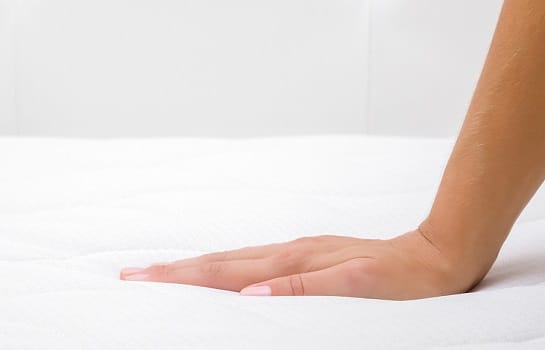Tips for Increasing the Life Expectancy of Your Mattress
A new mattress is a significant investment and therefore, you’ll want to take care of it to ensure that it lasts as long as possible. At Nothing But Beds, we are here to help you find the mattress of your dreams- and learn how to take care of it to make it last as long as possible.
Most mattresses last somewhere between 5 to 15 years. A higher quality one will be on the higher end, approximately 7 to 15+, while a lower quality one will be on the shorter end, approximately 5 to 7 years (or less). The type of mattress also dictates its life expectancy:
- Memory foam: a high-density foam mattress will typically last 10 to 15 years with proper care and accessories (such as a mattress protector). Low-density foam usually lasts 5 to 7 years, even with proper care. Memory foam does last longer than polyfoam and the thicker the mattress, the better it will keep its shape.
- Innerspring: the average life expectancy of a spring mattress is between 6 to 7 years, depending on the quality of the coils/springs. The reason these mattresses don’t typically last as long is that they are susceptible to sagging. A spring mattress with a higher coil gauge isn’t going to last as long as one with a lower coil gauge.
- Hybrid: the life expectancy of a hybrid mattress varies depending on the materials used, but typically lasts between 6 to 10 years. Due to the coils, they are susceptible to sagging over time. A hybrid mattress that uses latex is going to last longer than one that only uses memory foam.
- Latex: a latex mattress has the longest life expectancy- between 8 to 15 years. These mattresses are known for their durability. Natural latex is more durable than synthetic.
- Airbed: an airbed also has a higher life expectancy, between 8 to 15 years because the pressurized air prevents issues such as body impressions and sagging. However, they are likely to malfunction, which reduces their lifespan.
- Waterbed: a waterbed will typically last between 7 to 10 years, depending on how well you take care of it and whether or not you develop a leak.
- Futon: a futon mattress isn’t designed to be slept on every night, so they typically only last about 5 years.
One way that you can tell how long to expect a mattress to last is the warranty offered by the company. Of course, just because the warranty is for 20 years does not mean that you can sleep comfortably for that long- it just means the company guarantees that it will not malfunction prior to that.
Increase the Life Expectancy of Your Mattress
Now that you know how long you can expect your mattress to last, let’s take a look at some tips to help you increase the life expectancy of your mattress:
Use a mattress cover
A mattress cover is thin and typically fits over your mattress like a fitted sheet. Some of them have zippers to completely enclose the mattress. You can find them in a variety of materials, including bamboo, polyester, latex, cotton, plastic, or vinyl.
A mattress cover will protect your mattress against spills and dirt, as well as prevent abrasions on the mattress from body movement.
Clean linens at least once a week
Your body is always producing oil- and some people produce more than others. This oil rubs off onto your linens and can soak into your mattress. Body oil will quickly break down mattress fibers, so you need to wash your linens and anything else that comes into contact with your skin at least once a week. You should also consider tossing in your mattress cover with the linens, especially those that are made of cotton, polyester, and bamboo. You can wipe down latex, plastic, or vinyl covers.
Use a mattress pad
We can all agree that accidents are a part of life. A mattress pad is like an insurance policy for your mattress. A mattress pad is not the same thing as a mattress cover. A pad is thick and can prevent things like bodily fluids, spills, etc from getting to the mattress, especially if used with a mattress cover.
Rotate mattress regularly
Some manufacturers claim you don’t need to rotate your mattress- but it will extend the life expectancy if you do. Your body weight puts pressure on the internal structure of your mattress, which can be permanently deformed if you don’t give it time to restore itself.
When you rotate your mattress, you evenly distribute your weight, which allows the internal structure time to revive itself. You should rotate it approximately every 3 months. If you or your partner is heavier, it should be done more often.
Watch for bedbugs
In recent years in the United States, there has been an uptick in bedbugs. Many people assume that they are associated with the cheaper motels- but they have also been found in fancy hotels. Therefore, if you travel, make sure to check for bedbugs. You don’t want to bring back eggs, nymphs, and adults home where they can infest your furniture.
When you arrive at a hotel, check for bedbugs in pillow seams, mattress seams, behind the headboard, and in the furniture close to the bed. If you see any indications that they are present, change hotels- or at least change rooms.
Additionally, when you return home, even if you didn’t see any signs of bedbugs, make sure to wash your clothes at the hottest temperature you can.
Clean mattress regularly
If you were to look at dust particles under a microscope, you would find that some are hard and have sharp edges. This basically means that dust particles are like tiny knives, cutting the fabric of your mattress.
Therefore, take the time to vacuum your mattress at least once a month with special upholstery attachments. This will give you strong suction as well as clean the cracks and crevices.
You should not eat in bed, but if you do make sure to clean up food crumbs as soon as possible. The longer you wait, the more insects will be attracted to your mattress.
Be careful with pets on your bed
If you have pets, chances are you treat them like family members- even allowing them to get in bed with you. The problem is, pets can damage your mattress and reduce its lifespan if you don’t take extra care. At the very least, you need a mattress cover and mattress pad. Also, you’ll want to wash your linens more often if you sleep with your pets. You may also consider using a blanket on top of your linens for extra protection.
Conclusion
A mattress is a significant investment- especially if you get a really nice one. Therefore, you want to take proper care of it to ensure that it lasts as long as possible. The average life expectancy is between 7 to 15 years- but you can make it last a bit longer with proper care and maintenance.
If you’re considering a new mattress, visit the showroom at Nothing But Beds. We have two locations to serve you: Andrews, North Carolina and Murphy, North Carolina. We offer a variety of mattress sizes and types- we’re sure to have something for you!





